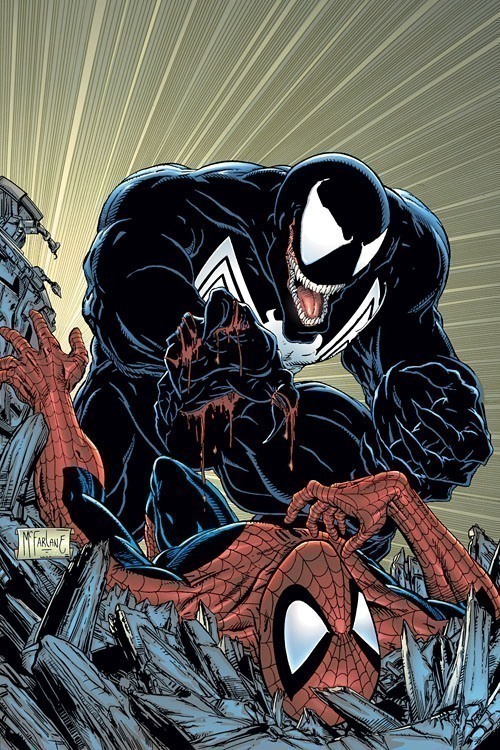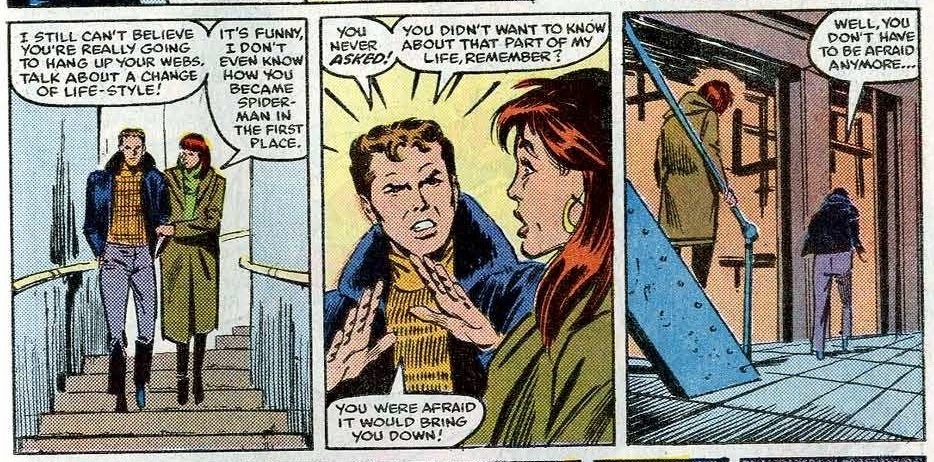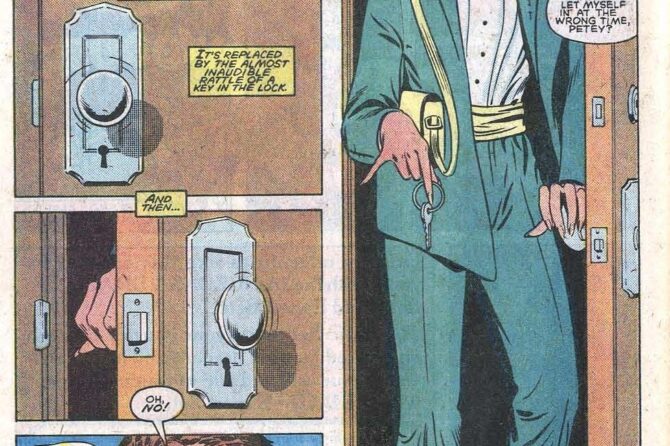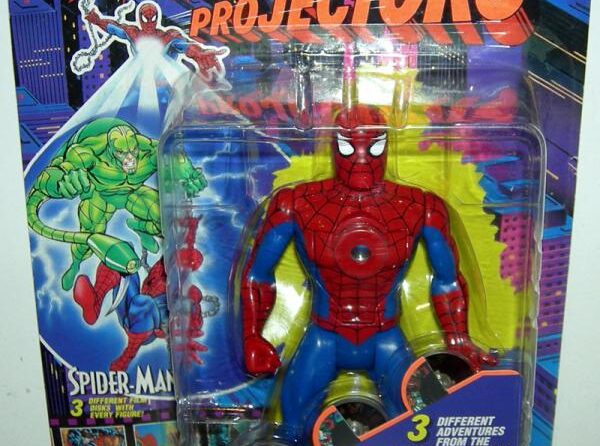In this instalment we address perhaps the most controversial element of Venom’s origin. Why Brock held Spidey as the one responsible for his problems.

As with all of the most recent instalments we are addressing this criticism I outlined back in Part 1.
- Eddie Brock’s motivations for hating Spider-Man are weak and make no sense
And also as before please re-familiarize yourselves with Brock’s origin pages from ASM #300.
Irrational Realities
In prior instalments I’ve spoken a lot about Brock’s psychology in order to illustrate how mentally unhinged he was (and how this was deliberately part of the story). However, even if a reader did recognize Brock as delusional, the fact that he targeted Spidey specifically can still seem either illogical and/or overly convenient from a creative point of view.
To address this we need to remember that a major part of Brock’s intentions as a villain was that he was a super villain stalker for Spider-Man; I discussed this at length way back in Part 4. As such the character must be viewed through that lens and judged in the context of that archetype for villains.
With this in mind we could counterpoint the above criticism by simply saying that a delusional person by their nature doesn’t need to have a rational reason for their actions. And since the point for the character was to be a delusional psychotic stalker it is thereby invalid to reprimand said character for not having a strong reason to hate the protagonist. That is to say that the point was that Brock’s hatred was irrational and unreasonable.
This is actually an idea somewhat corroborated by this excerpt from J.R. ‘Madgoblin’ Fettinger’s ‘The Dark Side of the Spider’ essay.
For myself I actually vaguely recall a story about someone who set their mind to killing a musician because they interpreted their songs to be coded messages about how they wanted to kill him.
To give a more notorious real life example, let us consider Mark David Chapman, more infamously known as the man who murdered John Lennon of the Beatles fame.
As some initial food for thought consider that Brock and Chapman both allegedly held (to varying degrees) strong religious beliefs and that the latter’s mother was apparently unmoving towards him, something later stories (by Michelinie) also establish about Brock’s father.
More strikingly though Chapman after killing John Lennon was diagnosed with being in a delusional psychotic state when he carried out the murder. Reportedly the murder was motivated by a desire for notoriety, because Lennon ‘was a phoney’, because Chapman hated celebrities in general, and a host of other reasons. Notice how rationally these do not make much sense at all; not unlike Brock’s vendetta against Spidey.
These examples demonstrate how it is sadly perfectly realistic for unstable individuals to act in dangerous, anti-social, stalkerish ways towards other people for totally irrational reasons.
Why didn’t Brock blame anyone else?
However in the case of Eddie Brock his hatred for Spider-Man wasn’t arbitrary.
To begin with Brock’s choice makes a certain amount of warped sense when you think about it from Brock’s point of view, a view that (as discussed in prior parts) was trying to absolve himself of any blame.
Spider-Man was involved in the apprehending of the Sin Eater who’s capture directly led to Brock’s story being debunked. It wasn’t as though Brock’s downfall was completely divorced from anything to do with Spider-Man and he chose him at random. Although as we’ve discussed this wouldn’t have been unrealistic at all; indeed Brock had comparatively better justification for his vendetta than the above real life examples.
Nevertheless you do have to wonder why Brock didn’t place any blame onto Daredevil, who was also involved (though not as directly) in the capture of the Sin Eater? In fact why didn’t he also blame the real Sin Eater or Emil Gregg who’d deceived him? Why hinge so much of his fall from grace on Spider-Man’s shoulders?
The answer is because Spider-Man was the person who simply stood out the most (even next to another superhero and especially compared to two ‘normal’ people) and was simply the most enticing target for Brock’s unhealthy mind. The reasons for this have much to do with Spider-Man’s appearance, fame and anonymity.
Daredevil might’ve been mentioned in the news reports about Sin Eater’s capture but the reports more than likely placed greater focus upon Spider-Man’s involvement. Partially this is because he was the person who physically incapacitated the Sin Eater and partially because he’d had the most reported history of confrontations with him in the course of the case. For instance he was involved in an earlier street shootout with Sin Eater where the latter fired a shotgun into a crowd of bystanders.
Spider-Man is also frankly just far more famous than Daredevil. Daredevil mainly sticks to Hell’s Kitchen whilst Spidey tends to roam around NYC more. Spidey also began his career as a televised celebrity where he became a national sensation. After that he became the focus of a lot of news put out by Jameson, his various media outlets (Jameson made TV appearances even in the 1960s) as well as his rivals, such as the Daily Globe where Brock worked. Heck in the Marvel Universe Spider-Man is so famous he even had his own parade float!

As for why Brock didn’t blame Gregg, that is likely attributable to his potentially feeling compassion for him, as discussed back in Part 6. If we accept that Brock might’ve felt genuine compassion for Emil Gregg when he thought he was a murderer then he might not have blamed Gregg for his deception. This might’ve even had something to do with Gregg’s proven history of mental illness.
Similarly Stan Carter’s mental issues were public knowledge and he had had a respected history as a police officer and S.H.I.E.L.D. agent, people who to Brock were worthy of respect; see Part 7 for more on that. Furthermore as I already mentioned, Carter and Gregg were both men of God like Brock himself with Gregg apparently being a fellow Catholic. In Carter’s case this is somewhat supported by Brock’s claims that he might’ve wised up and stopped killing since he knew he couldn’t have been caught, demonstrating a leniency for the man.
Further food for thought is provided by the timing of ASM #300. In Spectacular Spider-Man #134-136 Stan Carter had re-entered the public eye as seemingly rehabilitated individual coping with physical handicaps inflicted by Spider-Man’s assault on him. Apologetic for his actions, he’d begun telling his own story to the public before ultimately committing suicide by cop; see Part 7 for some of the pages from that story.
The events of this story were published and in-universe chronologically occurred prior to ASM #298. They were also indirectly referenced in that issue.
In Spec #134-136 Spidey battled and was very publically defeated by Electro.

In ASM #298 Brock’s wall of news clipping displays a headline which (like the above image) references Spidey’s encounter with Electro.


Brock likely would’ve been aware of these very public events surrounding Carter, including his crippling at the hands of Spider-Man and (like some other members of the public) might’ve been moved to further sympathy for him. In his own mind Carter’s injuries and Spidey’s public harassment of him thereafter might have even provided further proof of Spider-Man’s malevolence.
Whilst this potentially addresses why Brock didn’t blame Carter or Gregg (or Daredevil) for his problems, it doesn’t fully explain why he chose Spider-Man as the bearer of his loathing; at least not beyond the mere fact that he was delusional and therefore irrational.
To address that we need to consider the nature of Spider-Man himself particularly in the context of Brock’s role as a stalker character.
Public Perceptions
At the time ASM #300 was published Spider-Man within the public eye had been simultaneously characterized as a big time hero (note the TV screen in Brock’s flashback sequence) and/or a major public menace. Many (maybe even most) people in New York even in modern day stories seemingly buy into the latter perception of Spidey thanks largely to the years long slander campaign by J. Jonah Jameson and the Daily Bugle, which itself has inspired similar narratives from other news outlets.
Living in NYC and working for the Globe Brock was likely highly exposed to this slanderous narrative and so in the midst of his anger, despair he’d naturally gravitate towards the ‘public menace’ of Spider-Man as an inviting scapegoat for his problems.
Furthermore (as touched on above) Spider-Man was immensely famous, and famous specifically for nothing less than having literal super powers.
In terms of his place within the pop culture of New York/America and the degree of his penetration into the public consciousness Spider-Man was on a similar level to an A-list actor or musician in the real world. Actually that analogy is all too appropriate for Spidey since he first burst onto the scene as a wrestler and television performer, meaning he had a degree of celebrity about him from the get go. In truth given how Spidey is a bright, colourful, mysterious and literally superhuman figure who routinely engages in spectacular battles with equally larger than life colourful characters, he (and other superheroes) probably outshone the normal celebrities of the Marvel Universe.
Spidey also regularly saved lives and had been seen and (sometimes) recognized as the very definition of a hero. This would further his place as larger than large within the collective consciousness of the New Yorkers and pop culture in general.
Even putting his uncommon altruism and self-sacrifice aside, we have to consider some of the (relative) realities of his being a super powered being.
Forget being larger than life, Spider-Man to the common observer would seem to be someone figuratively and literally beyond human and above ‘mere mortals’. He literally swoops down from the air, flips around, bench presses cars and suspends crooks upside down all in the blink of an eye. That is going to leave an impression on anyone, hence why Spider-Man photographs in the Daily Bugle and other publications sell so well.
After all how much news and other such material is printed about the lives of celebrities in the real world? In fact everyone in the world you and I live in knows who Spider-Man is even though he isn’t even real. With that in mind consider how much Spidey (one of the first heroes to emerge after the Fantastic Four) would stick in the minds of residents in Marvel Universe New York City. In fact between the Bugle and other news outlets’ efforts, seeing or hearing about Spider-Man and his exploits would be inescapable. He’d be shoved in your face whether you liked it or not.*


Unfortunately as Mark David Chapman and countless other examples prove, celebrities (due to their larger than life prominence in society) inevitably attract the attention of mentally unhinged individuals.
It is a point illustrated through the character of Mary Jane Watson as she has had numerous stalkers due to her prominence as an actress and model, several under the tenure of Venom’s co-creator David Michelinie.
Taking all this into account it actually makes all too much sense that Spider-Man would similarly draw the attention of unstable individuals like Brock who stalk him out of revenge for imagined slights. It all feeds back into the super powered celebrity stalker conception and presentation of the character I spoke about back in Part 4.
In fact even for unstable individuals with less justification than Brock would find Spidey an enticing target of their delusions, especially if they (like Brock) were subconsciously seeking out a scapegoat.
Appearances and Anonymity
Spidey’s attractiveness to unstable potential stalkers is not helped at all by his appearance, specific powers and his anonymity to the public.
Spider-Man’s costume (particularly the intimidating black suit he was wearing back in 1988) covers his entire body, giving no hint as to his identity beyond his general build and to a lesser extent gender. His mask doesn’t even evoke a human face containing no hint of a mouth, nose or ears, just large white shiny eyes of a distinctly inhuman shape.

The overall effect of the costume (especially the black one) serves to profoundly dehumanize Spider-Man to the outside observer. It is an effect exacerbated when you consider that he shoots spider-like webbing from his wrists, has the ability to literally crawl on walls and ceilings, apparently knows when you are behind him and can perform feats of strength and acrobatics which are well beyond human capabilities. Putting aside the bad reputation spiders tend to have as creepy crawlies, it’s easy to see how Spider-Man could be unnerving or seem monstrous to a lot of people if he really existed.
As some food for thought consider how the highly religious Eddie Brock outright referred to Spidey as a demon at one point in ASM #300.
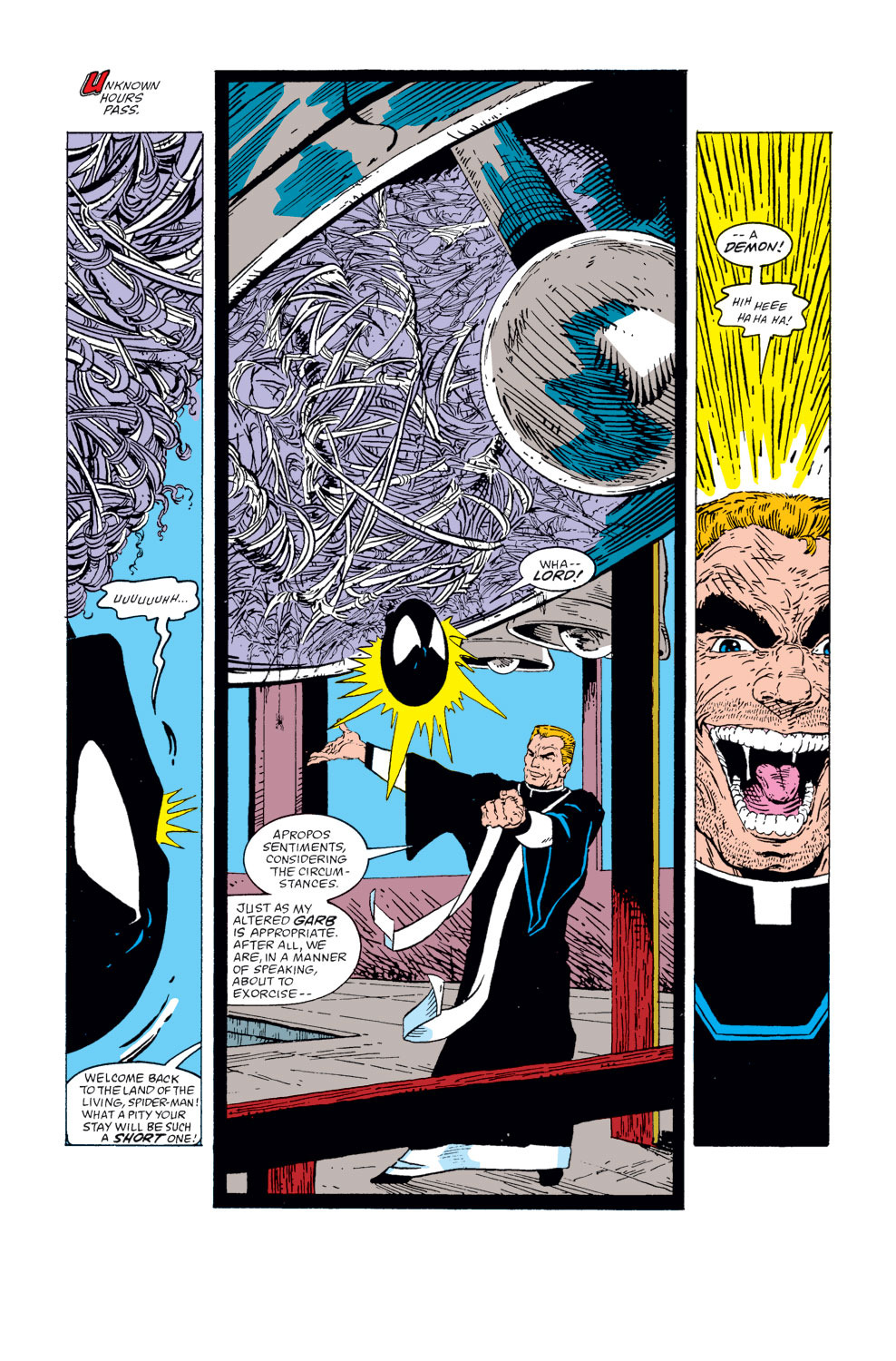
Whilst Spider-Man’s costume makes him easy to demonize, his anonymity exacerbates the problem.
Thanks to his identity being secret and his costume completely obscuring any features of his face Spidey becomes an ideal blank canvas for unstable people like Brock to project their frustrations onto. This is not a dissimilar psychological phenomenon to how executioners (such as during World War I) found it a lot easier to kill when their prisoner’s face was covered. The act of dehumanizing them made hating and consequently hurting their targets a lot easier.**
Put simply Spider-Man’s powers, appearance, activities, negative public opinion and direct involvement with the Sin-Eater case made him the ideal scapegoat for Brock’s delusional and vulnerable mind to scapegoat his misfortunes onto.
With that we’ve essentially covered all the criticisms I laid out back in Part 1. However there are some tangential points I feel are relevant to building up a better picture of Brock as a character and ASM #300 as a story.
However we will begin looking at those next time though.
*And wouldn’t having Spidey shoved in your face (say by the TV) be especially irksome if he was being praised in some way (like being called a hero) if you felt slanted by him? Couldn’t it even exacerbate those negative feelings you’d be feeling?
**Despite his bright costume and choice of theme, Daredevil next to Spider-Man would seem much more ‘normal’. Whilst his ability to seemingly know where you are no matter what is impressive, he isn’t doing anything obviously super human like crawling on walls, spinning webs or even bench pressing heavy objects.
Anyone who might get a hint that Daredevil has superpowers is probably just a common crook in Hell’s Kitchen. The average person on the street would probably have even less clue about his super senses than they would about Spider-Man’s Spider Sense.
Plus someone running around in a bright red costume with devil horns is realistically probably going to look less scary and intimidating than someone in virtually all black with huge bug eyes. Especially when there is no indication about what the latter looks like under his mask. The former meanwhile has a costume that clearly reveals he has a human face beneath his mask and a seemingly handsome one at that.
Between all this and his comparatively better public reputation, Daredevil was a lot less dehumanized to Brock and seemed less ‘above’ him than Spider-Man, making him a less attractive receptacle for his frustrations.
Furthermore in the Sin Eater case the news at most might have mentioned DD’s efforts to stop Spider-Man from killing Carter, and later trying to protect the latter from an angry mob.
If Brock had felt any kind of sympathy for Carter then these actions would’ve more positively inclined Daredevil towards him, making it less likely he’d gravitate to him as a target. In fact DD’s role in fighting off Spider-Man (if that was reported) might have caused Brock to outright like him due to his dislike of Spidey.

